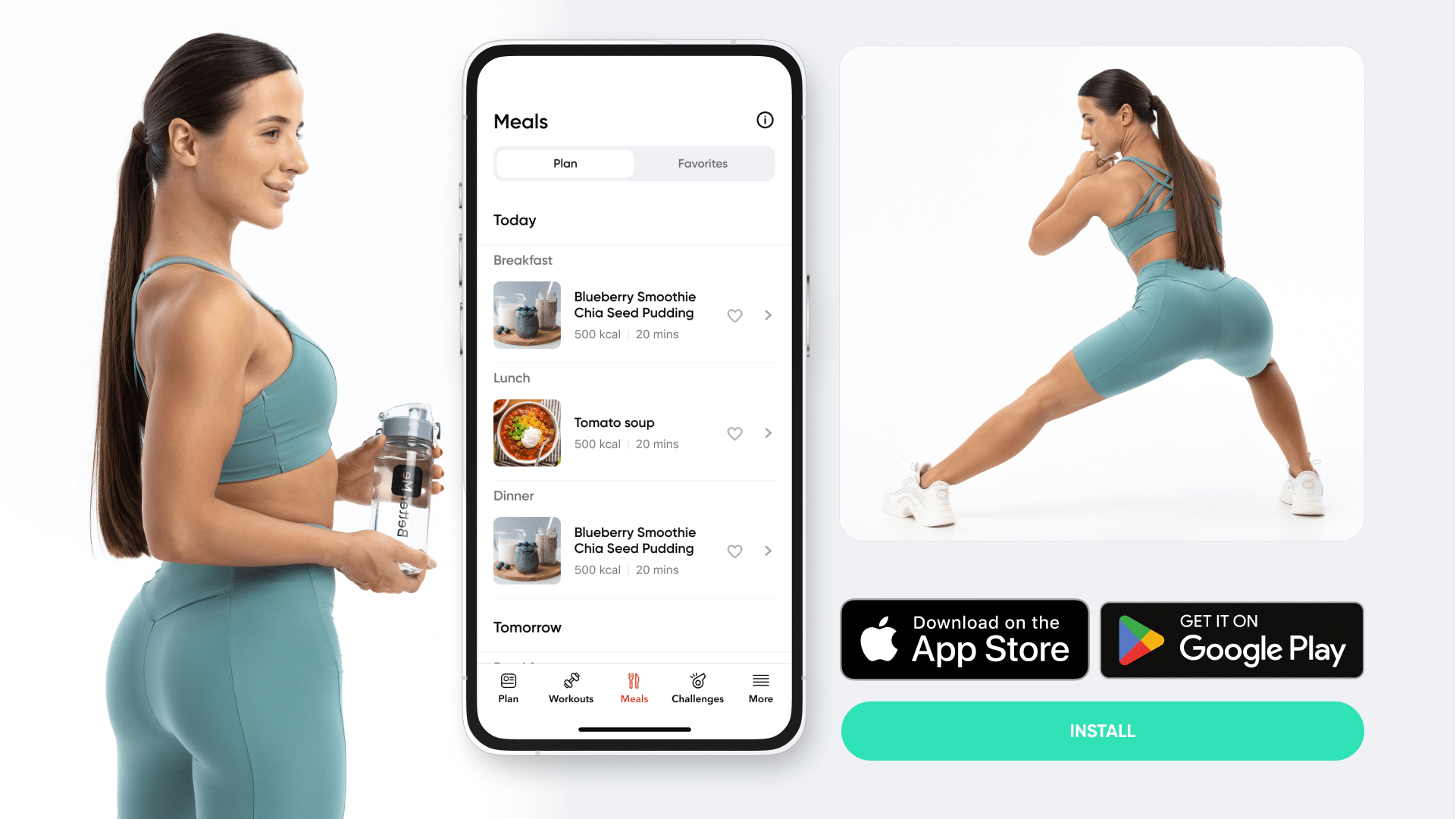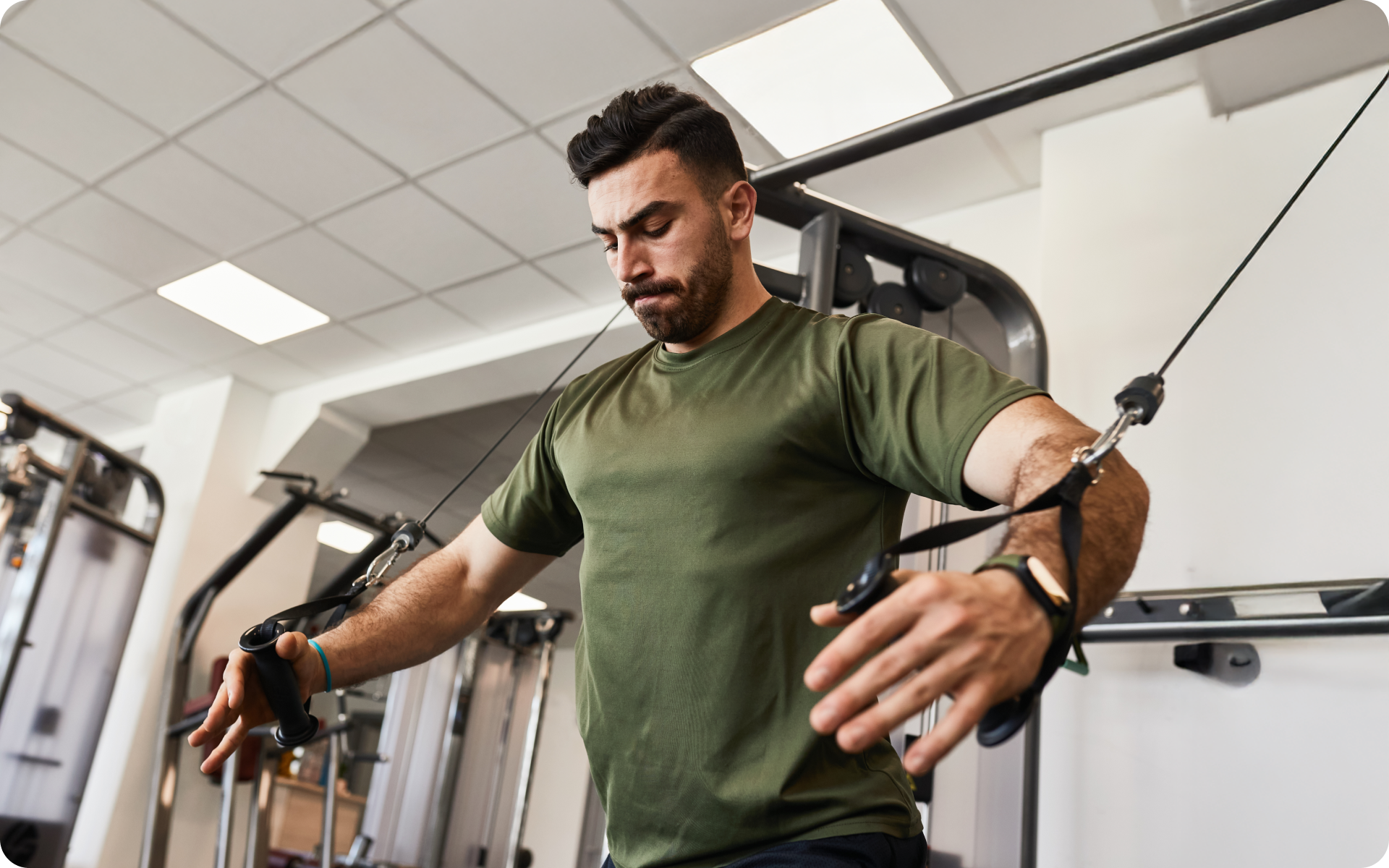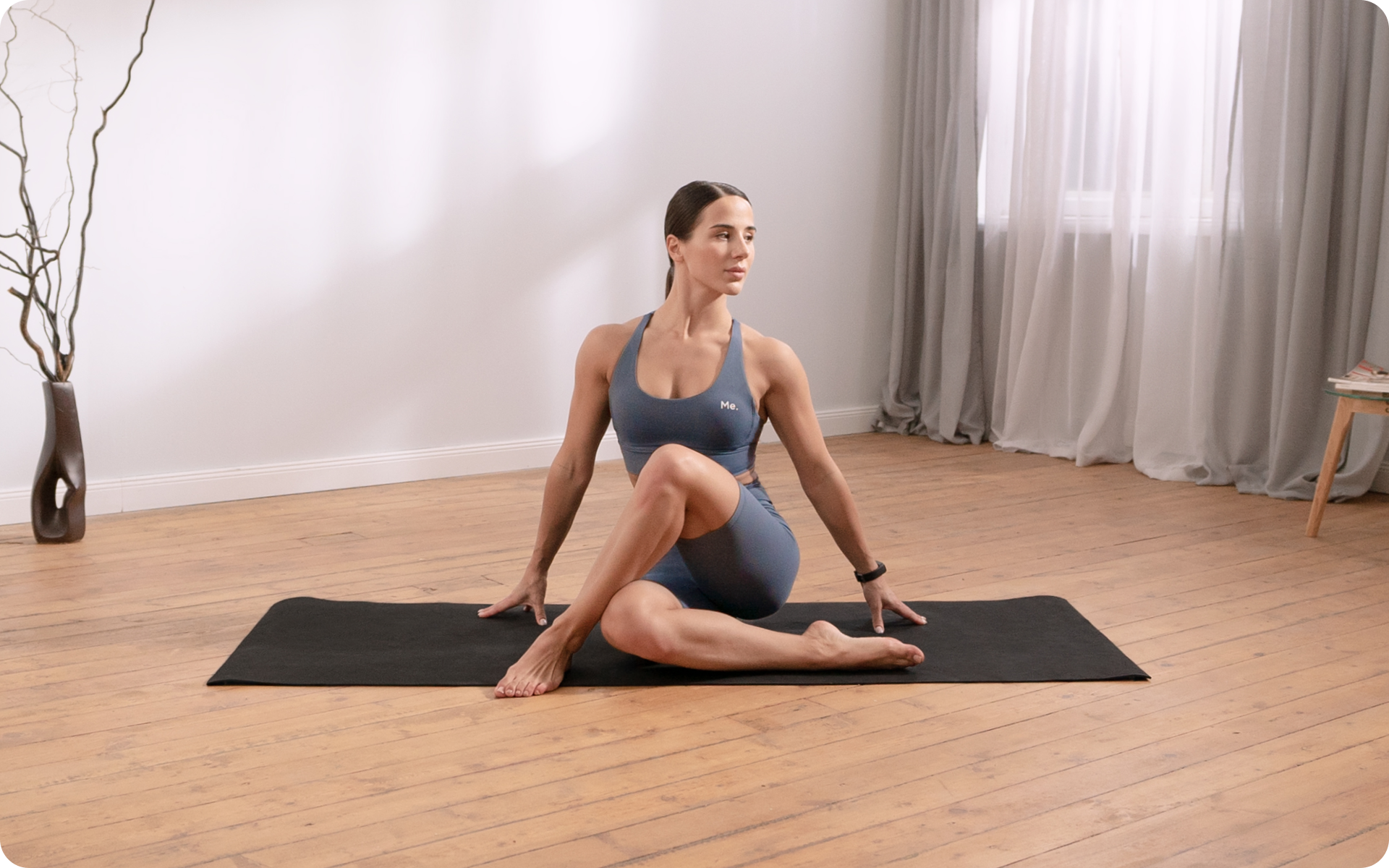Getting time for exercise can be difficult, and those who lead hectic lifestyles often have to decide between working out and getting enough rest—or squeezing in a late-night workout session in the hopes of getting both. But is working out before bed really that beneficial?
The short answer is, it depends. Everyone has different needs and preferences regarding exercise, so there’s no one-size-fits-all answer.
Working out before bed can be beneficial in certain circumstances, while it may be counterproductive in others. To help you make an informed decision about whether or not late-night exercise is right, we’ve broken down the pros and cons.
We’ll also share our top sleep hygiene tips so you can get the most out of your late-night workout while still getting enough rest.
Why Is Sleep So Important for Exercise?
As we all know, getting a good night’s sleep is important for overall health and well-being (32) (37). But when you’re exercising to lose weight or improve your body composition (aka the ratio of fat to muscle), a good night’s sleep is even more important (1).
Sleep deprivation has been linked to:
- Impaired performance – When you’re sleep-deprived, your body’s capacity for physical performance is reduced (28).
- Interference with muscle growth – If you’re trying to build muscle, sleep is even more important. Research has found that sleeping for at least seven hours a night helps your body produce the hormones it needs to repair and grow muscle (23).
- Decreased motivation – Exercise can be hard enough without the added hurdle of fatigue. This means you’re more likely to quit if you’re sleep-deprived.
- Unhealthy cravings – The effects of sleep deprivation have been linked to an increase in unhealthy cravings, which can easily derail any diet plan (34).
- Increased inflammation – Sleep deprivation has been linked to higher levels of inflammation, which can lead to a variety of chronic health issues (29).
Conversely, getting enough sleep helps:
- Boost energy and mood – Getting a good night’s sleep can help keep your energy levels and motivation up for your workouts (31).
- Increase performance – Sleep helps your muscles and brain recover, so you can maximize the benefits of exercise (25) (27).
- Support weight loss – If you’re trying to lose weight, getting enough sleep is essential. Studies have found that sleeping for at least seven hours a night can help regulate hunger hormones and support weight loss (24).
Yanking yourself back in shape has never been so easy with our game-changing fitness app! Start transforming your life with BetterMe !
The Pros and Cons of Working Out Before Bed
Now that we’ve discussed why sleep is so important for exercise, let’s get into the pros and cons of working out before bed.
Pros of Working Out Before Bed
Late-Night Exercise Can Help You Wind Down
For some people, late-night exercise can be a great way to unwind after a busy day. Research has found that moderate-intensity exercise such as running, cycling, or swimming can help reduce stress levels and improve sleep quality (2).
This is because physical activity releases endorphins and other hormones that can help you relax and clear your mind (15) (19). A late-night workout session can also give you a sense of accomplishment, which can help you fall asleep more easily.
You’re More Likely to Adopt a Healthy Lifestyle
Working out late at night can be beneficial in the long run, as it may make you more likely to incorporate exercise into your lifestyle.
Think about those nights when you’re sitting for hours in front of the TV after work—you’re not doing your body any favors. In addition, research has found that late-night snacking can lead to weight gain (33).
By making time for exercise late in the evening, you’ll be less likely to indulge in unhealthy snacks and more likely to stick to a consistent workout routine.
Cons of Working Out Before Bed
Working Out Too Close to Bedtime Can Impact Sleep Quality
While moderate-intensity exercise can help you wind down, working out too close to bedtime can have the opposite effect. This is because exercising too close to bedtime significantly reduces melatonin levels (20). Melatonin plays a key role in the sleep-wake cycle.
It’s recommended that you finish your workout at least an hour before bedtime so your body has time to cool down. If you’re pressed for time, try doing a low-intensity activity such as yoga or stretching, which can help you relax without getting your heart rate up.
It Can Compromise Your Body’s Natural Circadian Rhythm
Your body has a natural circadian rhythm that is linked to the rising and setting of the sun. This rhythm helps regulate your sleep-wake cycle, and when it’s disrupted, this can lead to fatigue and difficulty focusing (5).
Late-night exercise can interfere with hormone processes, disrupt your circadian rhythm, and interfere with your body’s natural sleep-wake cycle (16) (18). This can be particularly problematic for those with pre-existing sleep disorders such as insomnia, as it can make it even harder to get quality sleep.
Read more: Thigh Workout Guide: 7 Effective Exercises for Building Leg Strength
Which Exercise Is Good Before Bed?
Now that we’ve looked at the pros and cons of working out before bed, let’s look at which exercises you can do before bed.
Low-impact Activities
Low-impact activities such as walking, yoga, or stretching are ideal before bed as they don’t raise your heart rate too much. Studies have found that low-intensity activities help reduce stress levels and can relax your body and mind so you can sleep more soundly (15).
Moderate-Intensity Exercises
Moderate-intensity exercises such as jogging, swimming, or cycling can also be beneficial before bed. These activities should be done at least an hour before you go to bed to give your body time to cool down.
Intense Exercises
Intense exercises such as heavy weight training, HIIT, or sprinting should not be done close to bedtime. These activities increase heart rate and release adrenaline, which can make it difficult to fall asleep (18).
Our previous blog, Benefits of Push-Ups Everyday, provides insights on everything you need to know about push-ups in order to burn the fat around your midsection.
What Counts as Good Quality Sleep?
There are several aspects of good sleep, which can be summarized as follows (36):
- How quickly you fall asleep – one measure of good sleep is how fast you fall asleep. If it takes less than 30 minutes for you to get to sleep, this is a sign of good sleep.
- How long you stay asleep – the length of time you remain in bed is another indicator of good sleep, as this indicates that you’re going through all the necessary stages of sleep.
- How many times you wake up – waking up multiple times during sleep could be a sign of poor quality sleep and can be caused by a variety of factors such as stress and sleep disorders.
- How alert you feel during the day – if you’re still feeling drowsy and fatigued during the day, this could be a sign that you’re not getting enough restful sleep.
How to Better Manage Working Out Before Bed
If you choose to exercise before bed, there are a few things you can do to help manage your sleep. These sleep hygiene habits may help:
Having a Regular Bedtime
The human body thrives on routine, especially when it comes to sleep. The more consistent you can be with your bedtime, the better.
When your body gets used to a certain bedtime and wake-up time, it will naturally start to feel tired at around the same time each night. This is thanks to your internal clock or circadian rhythm.
The circadian rhythm is a 24-hour cycle that regulates the body’s sleeping and waking patterns, in addition to vital functions such as appetite, heart rate, and metabolism. When you disrupt this rhythm by exercising late at night, it can be more difficult to get quality sleep (4).
However, if you plan for your workout to be earlier, and set aside a certain time to do it each day before proceeding to bed an hour later, your body will eventually adjust and you’ll get used to exercising before bed.
Avoiding Stimulants Before Bed
Stimulants such as caffeine and nicotine can interfere with your natural sleep-wake cycle, which makes it hard to fall asleep (13). Try avoiding caffeine and nicotine at least 6 hours before bedtime if possible, or opt for a decaf coffee or tea instead.
Note that many pre-workout supplements contain stimulants, so it’s important to read the ingredients and opt for ones without caffeinated ingredients if you intend to work out close to bedtime. You may want to fuel yourself with a light snack with some protein, carbs, and healthy fat instead.
Wind Down with a Relaxing Routine
Exercise can be part of your bedtime routine, but you should also make time to wind down and relax before you go to sleep.
Consider spending the last hour of your day engaging in calming activities such as reading, journaling, or stretching. This can help your body and mind transition into a restful state and make it easier to fall asleep.
Minimize Daytime Naps
Naps can help restore energy, but if you’re having trouble falling asleep at night they may not be your friend. Try to limit naps during the day, and if you must nap, opt for a short (20-30 minutes) power nap in the afternoon.
Beware of Blue Light
Blue light from devices such as computers and mobile phones can also disrupt your circadian rhythm, so avoid using these for at least an hour before bed (3). If you must use a device, consider using a blue light filter to reduce the amount of blue light emitted from the device.
Make Temperature Considerations
To fall and stay asleep, your bedroom should be dark, quiet, and relatively cool. The optimal temperature for sleep is usually between 60 to 67 degrees Fahrenheit (15.5 to 19.4 degrees Celsius). If your bedroom is too warm, consider using a fan or air conditioning to cool it down.
Choose comfortable clothes to sleep in, as tight or uncomfortable clothing can interfere with your ability to get quality rest. Cotton and other lightweight fabrics are usually best for sleeping as they’re soft, breathable, and lightweight.
If you wish to cinch your waist, tone up your bat wings, blast away the muffin top – our fitness app was created to cater to all your needs! BetterMe won’t give excess weight a chance!
Avoid Eating Spicy, Greasy, or Heavy Meals Before Bed
Eating a heavy meal right before bed can make it harder to fall asleep as your body works to digest the food. To facilitate healthy digestion, you should avoid eating two to three hours prior to sleeping (9).
In addition, foods that are greasy, spicy, or acidic can cause heartburn, which may make it more difficult to get comfortable and fall asleep (22).
Below are some ideal late-night snacks that are healthy and easy to digest. They also make great post-workout snacks if you’re exercising at night:
- Greek yogurt or cottage cheese with berries
- Hummus and celery sticks
- Almond butter and banana slices
- Apple slices with nut butter
- A few nuts or seeds
- Hard-boiled eggs
- A smoothie with frozen fruit and milk or plant-based milk
- Kale chips
- Avocado toast
- Popcorn with a sprinkle of nutritional yeast
- Homemade trail mix.
Don’t Lie in Bed Worrying or Stressing
If you find your mind racing with worries after getting into bed and you can’t seem to shut it off, try getting out of bed and reading a book or engaging in a calming activity such as deep breathing or guided meditation.
If you can’t seem to quiet your mind, try writing down some of your worries in a journal before getting back into bed. This can help to get your anxious thoughts out of your head and onto paper so you can relax and fall asleep more easily.
The problem with tossing and turning for 20 minutes or more is that it can start to feel like a chore, so you may start associating your bed with stress and anxiety.
Working Out at Night vs Morning: Is One Better for You?
The timing of your workout—whether in the morning or at night—depends on your personal preferences, lifestyle, and specific fitness goals.
For example:
- Morning Workouts: Better for those who are looking to boost their metabolism, improve mental clarity, and have a consistent routine.
- Evening Workouts: Ideal for those who aim to enhance performance, build muscle strength, and de-stress after a long day.
Here’s a comparison to help you decide which may be more beneficial for you:
Morning Workouts
Pros:
- Boosts Metabolism: Exercising in the morning can elevate your metabolism, which will help you burn more calories throughout the day (10).
- Consistency: Morning workouts are less likely to be interrupted by daily responsibilities or unexpected events.
- Mental Clarity: A morning workout can help improve focus and energy levels, which sets a positive tone for the rest of the day.
- Better Sleep: Some studies have suggested that people who exercise in the morning tend to sleep better at night, especially if they struggle with insomnia (12).
- Weight Loss: Morning workouts may be more effective for weight loss due to a heightened metabolism throughout the day and better adherence to workout routines (7).
Cons:
- Body Stiffness: Your body may feel stiffer in the morning, which makes it more difficult to get moving.
- Time Constraints: Morning workouts require waking up earlier, which may be challenging for some.
Evening Workouts
Pros:
- Performance: Research has suggested that late afternoon or evening exercise is superior to morning exercise, particularly for strength and power activities (30).
- Muscle Function and Strength: Your body temperature is higher in the evening, potentially leading to better muscle function and strength.
- Stress Relief: Evening workouts can serve as an effective way to unwind and de-stress after a hectic day (17).
- Flexibility: People often have more free time in the evening, which allows for longer and potentially more relaxed workout sessions.
Cons:
- Sleep Interference: Exercising too close to bedtime may interfere with the sleep patterns of some individuals (14).
- Disruptions: Evening plans and social commitments can sometimes disrupt your workout schedule.
Read more: Your Flat Tummy Workouts Just Got Better With This Guide
FAQs
How late is too late to work out?
It’s recommended to finish your workout at least 3 hours before bedtime to avoid any potential disruption to your sleep patterns. However, this may vary for each individual and their body’s response to exercise.
The concept of “too late” to work out can vary depending on:
Personal Preferences
- Sleep Patterns: Working out too close to bedtime may interfere with your sleep, especially if it’s a high-intensity session (14). It’s generally recommended to finish exercising at least 1-2 hours before going to bed.
- Energy Levels: Some people find they have more energy in the evening and prefer late-night workouts. If this is the case for you and it doesn’t impact your sleep, it’s perfectly fine.
Physiological Factors
- Cortisol Levels: Your body’s cortisol levels (which help with workout performance) are naturally higher in the morning (8). Evening workouts may not be as effective for muscle building or fat loss.
- Body Temperature: Your body temperature tends to peak in the late afternoon to early evening, which may make this time ideal for physical performance and less risk of injury (21).
Practical Considerations
- Gym Availability: If you’re relying on gym facilities, their operating hours will dictate how late you can work out.
- Daily Schedule: Balancing work, family, and other commitments may only allow for late-night exercise.
Ultimately, the best time to work out is when you can be consistent and when it fits into your lifestyle without negative impacts on sleep or daily activities. Listen to your body and adjust accordingly.
Will I gain weight if I sleep after exercise?
Sleeping after exercise will not directly cause you to gain weight. In fact, sleep is an essential component of recovery and can support your fitness goals (23). Weight gain occurs from a caloric surplus (38), not from the act of sleeping post-exercise.
Here are some factors you should consider:
Calorie Balance
Weight gain or loss primarily depends on the balance between the calories you consume and the calories you burn. If you’re in a caloric surplus (consuming more calories than you burn), you’ll gain weight, regardless of whether you sleep after exercising (38).
Muscle Recovery
Sleep is essential for muscle recovery and growth. During sleep, your body repairs muscle tissues that were broken down during exercise (23). This can help improve your overall fitness and muscle mass, which may increase weight in the form of muscle rather than fat.
Hormonal Regulation
Quality sleep helps regulate hormones related to hunger and metabolism, such as ghrelin and leptin. Proper sleep can help manage cravings and maintain a healthy metabolic rate (26).
Exercise Timing
The timing of your workout and subsequent sleep may influence your energy levels and recovery, but doesn’t significantly affect weight gain directly.
Diet and Hydration
What you eat and drink after exercising plays an important role. Consuming nutrient-dense foods and staying hydrated supports recovery without adding unnecessary calories. On the other hand, consuming excessive calories or alcohol post-exercise may lead to weight gain.
Nutrition before workouts is essential, but some people may experience trouble eating in the morning. Find out the possible causes and what you can do about it by checking our blog – Why Am I Not Hungry in the Morning?
What is the best time to work out?
Determining the best time to work out is a nuanced topic that can depend on various factors, such as individual preferences, goals, and daily schedules. Let’s explore the pros and cons for different times of day:
Morning Workouts
Pros
- Consistency: Exercising in the morning can help establish a consistent routine as fewer distractions and obligations typically arise early in the day.
- Metabolism Boost: Morning workouts can kickstart your metabolism, helping you burn more calories throughout the day (10).
- Mental Clarity: Starting your day with exercise can improve mental clarity, focus, and overall mood due to the release of endorphins.
- Improved Sleep Patterns: Regular morning exercise has been linked to improved sleep quality and better sleep patterns (12).
Cons
- Body Temperature and Muscle Function: Your body temperature is lower in the morning, which may affect performance (21). Proper warm-ups are crucial for preventing injury (35).
- Energy Levels: Limited energy after waking up can make intense workouts challenging. A light snack before exercising may be beneficial.
Afternoon Workouts
Pros
- Peak Performance: Physical performance and muscle function tend to peak in the late afternoon when body temperature is at its highest, enhancing strength, flexibility, and endurance (6).
- Stress Relief: Exercising in the afternoon can serve as an excellent way to relieve stress accumulated during the day (17).
- Social Opportunities: You are more likely to find workout partners or participate in group activities in the afternoon.
Cons
- Work and Family Commitments: Afternoon workouts can sometimes conflict with work or family responsibilities, which makes it more difficult to maintain consistency.
- Energy Dips: Some people experience a mid-afternoon energy dip, which can impact motivation and performance.
Evening Workouts
Pros
- Stress Reduction: Evening workouts can provide a perfect opportunity to unwind and destress after a long day.
- Supportive Environment: Gyms are often less crowded and you may find a more relaxed environment for your workout.
- Performance Peak: Similar to the afternoon, evenings often see enhanced physical performance due to optimal body temperature and muscle readiness.
Cons
- Sleep Impact: Intense evening workouts close to bedtime may impact sleep quality for some individuals due to elevated adrenaline levels (11).
- Routine Interruptions: Social engagements or fatigue from the day’s activities can interfere with your evening workout plans.
Experimenting with various times can help you identify what works best for you. Ultimately, the most effective workout schedule is one that fits seamlessly into your life and allows you to exercise consistently.
Check out our post, Bodyweight vs Weights, to find out the pros and cons of each of these workouts and how to choose the one that’s most suitable for your goals.
The Bottom Line
Working out before bed can be beneficial if you’re able to do it the right way. You should make sure you finish your workout at least an hour before bedtime and opt for low-intensity activities such as yoga or stretching. However, if you have pre-existing sleep disorders such as insomnia, late-night exercise may not be the best option for you.
In any case, make sure to practice good sleep hygiene and get enough rest—this is just as important as exercise for your overall health and well-being.
DISCLAIMER:
This article is intended for general informational purposes only and does not serve to address individual circumstances. It is not a substitute for professional advice or help and should not be relied on for making any kind of decision-making. Any action taken as a direct or indirect result of the information in this article is entirely at your own risk and is your sole responsibility.
BetterMe, its content staff, and its medical advisors accept no responsibility for inaccuracies, errors, misstatements, inconsistencies, or omissions and specifically disclaim any liability, loss or risk, personal, professional or otherwise, which may be incurred as a consequence, directly or indirectly, of the use and/or application of any content.
You should always seek the advice of your physician or other qualified health provider with any questions you may have regarding a medical condition or your specific situation. Never disregard professional medical advice or delay seeking it because of BetterMe content. If you suspect or think you may have a medical emergency, call your doctor.
SOURCES:
- Adequate sleep to improve the treatment of obesity (2012, ncbi.nlm.nih.gov)
- Aerobic exercise improves self-reported sleep and quality of life in older adults with insomnia (2010, ncbi.nlm.nih.gov)
- Blocking nocturnal blue light for insomnia: A randomized controlled trial (2017, ncbi.nlm.nih.gov)
- Circadian Rhythm and Sleep Disruption: Causes, Metabolic Consequences, and Countermeasures (2016, academic.oup.com)
- Circadian Rhythms (2022, nigms.nih.gov)
- Circadian Rhythms in Exercise Performance: Implications for Hormonal and Muscular Adaptation (2011, ncbi.nlm.nih.gov)
- Consistent Morning Exercise May Be Beneficial For Individuals with Obesity (2021, ncbi.nlm.nih.gov)
- Corticosteroids-Mechanisms of Action in Health and Disease (2017, ncbi.nlm.nih.gov)
- Does the Proximity of Meals to Bedtime Influence the Sleep of Young Adults? A Cross-Sectional Survey of University Students (2020, mdpi.com)
- Do Morning Workouts Boost Your Metabolism More Than Nights? (2022, issaonline.com)
- Effect of Nighttime Exercise on Sleep Quality Among the General Population in Riyadh, Saudi Arabia: A Cross-Sectional Study (ncbi.nlm.nih.gov)
- Effects of acute morning and evening exercise on subjective and objective sleep quality in older individuals with insomnia (2017, sciencedirect.com)
- Effects of caffeine on sleep quality and daytime functioning (2018, ncbi.nlm.nih.gov)
- Effects of Evening Exercise on Sleep in Healthy Participants: A Systematic Review and Meta-Analysis (2019, pubmed.ncbi.nlm.nih.gov)
- Effects of Exercise and Physical Activity on Anxiety (2013, frontiersin.org)
- Effects of exercise with or without light exposure on sleep quality and hormone responses (2014, ncbi.nlm.nih.gov)
- Exercise and stress: Get moving to manage stress (2022, mayoclinic.org)
- Neurobiology of the sleep-wake cycle: sleep architecture, circadian regulation, and regulatory feedback (2006, pubmed.ncbi.nlm.nih.gov)
- Neuromodulation of Aerobic Exercise—A Review (2016, frontiersin.org)
- Physical exercise at night blunts the nocturnal increase of plasma melatonin levels in healthy humans (1990, sciencedirect.com)
- Relationship between alertness, performance, and body temperature in humans (2022, journals.physiology.org)
- Risk factors for gastroesophageal reflux disease symptoms related to lifestyle and diet (2021, pubmed.ncbi.nlm.nih.gov)
- Role of Sleep and Sleep Loss in Hormonal Release and Metabolism (2009, ncbi.nlm.nih.gov)
- Short Sleep Duration Is Associated with Reduced Leptin, Elevated Ghrelin, and Increased Body Mass Index (2004, journals.plos.org)
- Sleep, recovery, and metaregulation: explaining the benefits of sleep (2015, ncbi.nlm.nih.gov)
- Sleep and Metabolism: An Overview (2010, ncbi.nlm.nih.gov)
- Sleep and muscle recovery: Endocrinological and molecular basis for a new and promising hypothesis (2011, sciencedirect.com)
- Sleep deprivation and the effect on exercise performance (1989, pubmed.ncbi.nlm.nih.gov)
- Sleep Loss and Inflammation (2010, ncbi.nlm.nih.gov)
- The Effect of Training at the Same Time of Day and Tapering Period on the Diurnal Variation of Short Exercise Performances (2012, journals.lww.com)
- The effects of sleep loss on capacity and effort (2014, sciencedirect.com)
- The Extraordinary Importance of Sleep (2018, ncbi.nlm.nih.gov)
- The Health Impact of Nighttime Eating: Old and New Perspectives (2015, mdpii.com)
- The impact of sleep deprivation on food desire in the human brain (2013, nature.com)
- Warm-up and stretching in the prevention of muscular injury (2007, pubmed.ncbi.nlm.nih.gov)
- What Is Sleep Hygiene? (2022, sleepfoundation.org)
- Why Sleep Is Important for Health: A Psychoneuroimmunology Perspective (2016, ncbi.nlm.nih.gov)
- “Calories in, calories out” and macronutrient intake: the hope, hype, and science of calories | American Journal of Physiology-Endocrinology and Metabolism (2017, journals.physiology.org)











